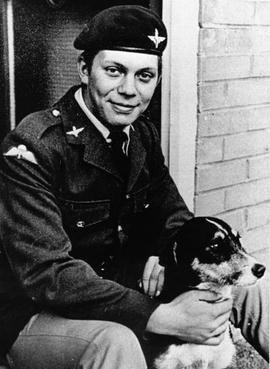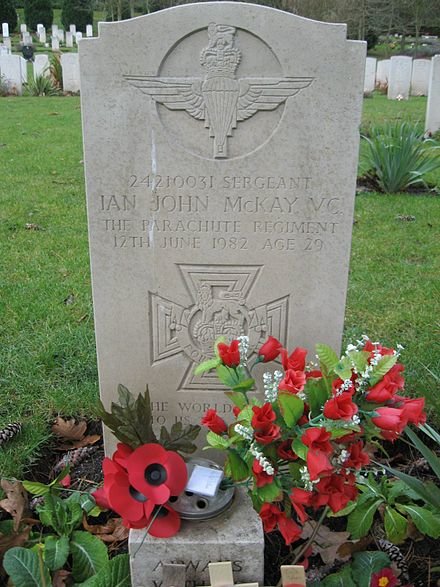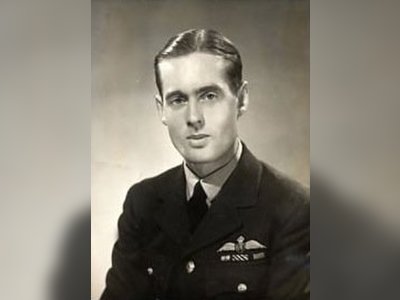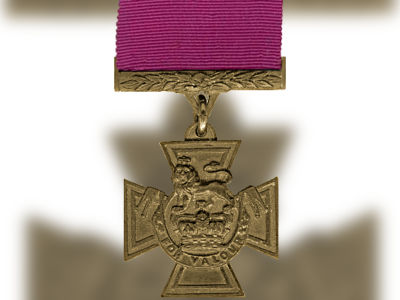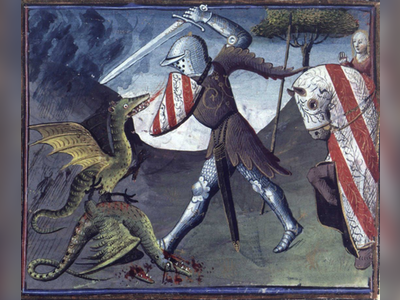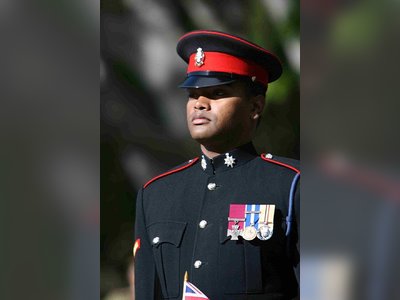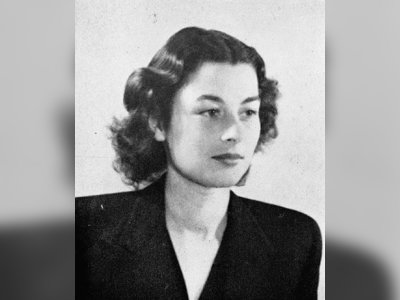British Heritage
Remember, Cherish, Learn.
beta
Ian McKay
A Testament to British Heritage and Valour.
Ian John McKay, VC (Victoria Cross) is a towering figure in British military history whose legacy continues to resonate in the collective memory of the nation. Born on 7 May 1953 and passing away on 12 June 1982, McKay’s life was cut tragically short, yet he made an indelible mark on British heritage. As a posthumous recipient of the Victoria Cross, the highest honour for gallantry in the face of enemy action available to British and Commonwealth forces, McKay stands as a lasting symbol of bravery, selflessness, and unwavering dedication to duty. His actions during the Falklands War, and the legacy left behind, form an important part of the shared British narrative of valour and resilience.
Born in Wortley, near Barnsley, South Yorkshire, McKay was the eldest of three sons to Kenneth John McKay, a steel worker, and Freda Doreen Hargreaves. His educational journey saw him attending Rotherham Grammar School, shaping his early years before he answered the call to serve his nation.
At the age of seventeen, in August 1970, McKay enlisted in the British Army and underwent rigorous training as a paratrooper. His first posting in early 1971 led him to the 1st Battalion, the Parachute Regiment (1 Para). This marked the beginning of an illustrious military career spanning various locations, including Northern Ireland, Germany, and within the United Kingdom. As a testament to his leadership skills and bravery, McKay rose to the rank of platoon sergeant of 4 Platoon, B Company, 3rd Battalion, The Parachute Regiment by April 1982.
McKay's gallantry and unfaltering courage came to the fore during the Falklands War, a pivotal period in British military history. Deployed with his unit for service in this conflict, McKay played a crucial role in the Battle of Mount Longdon. During the night of 11th/12th June 1982, his regiment mounted a silent night attack on an enemy position. The battleground was fierce, and McKay’s platoon came under heavy enemy fire, causing numerous casualties.
When the platoon's commander was incapacitated, leadership fell upon McKay. Understanding the need for immediate and decisive action, McKay chose to charge the enemy position, fully aware of the formidable forces arrayed against him. This valiant assault, despite being met with a hail of enemy fire and the loss of men from his team, resulted in the elimination of the enemy's strongholds.
McKay paid the ultimate price in this act of bravery. He was killed at the moment of victory, his body falling on the enemy bunker. His actions not only retrieved a precarious situation but also ensured the success of the attack. The exceptional selflessness, courage, and leadership displayed by McKay were recognized posthumously with the awarding of the Victoria Cross.
Following his initial burial in the Falklands, McKay was repatriated and re-buried with full military honours at Aldershot Military Cemetery on 26 November 1982. His Victoria Cross, sold by his wife around 2000, now rests on display in the Lord Ashcroft Gallery at the Imperial War Museum in London, serving as a poignant reminder of his bravery.
Beyond the decorations and official recognitions, McKay's legacy lives on in numerous memorials. His home town of Rotherham named the Territorial Army centre the "McKay VC Barracks" in honour of their native son. An accommodation block at the Defence Academy at Shrivenham bears the title McKay House, and a gymnasium at Vimy Barracks, Catterick Garrison, is named the McKay VC Gymnasium. Furthermore, the Sergeants and Warrant Officers bar at MPA, Falkland Islands, was renamed the "Ian McKay VC Bar" in 2011, cementing his connection to the land where he demonstrated extraordinary valour.
His story, dramatised in the 2006 television docudrama "Victoria Cross Heroes," continues to inspire new generations. Through archival footage and interviews, the docudrama commemorates his actions and gives viewers a glimpse into the heart of a true hero.
Ian John McKay remains a figure of immense respect and admiration in British military history and heritage. His remarkable bravery, leadership, and sacrifice in the face of adversity are attributes that have been embedded in the collective consciousness of the nation. They serve as potent reminders of the courage and resilience that have come to define the British spirit in times of conflict.
Early Life and Military Career
Born in Wortley, near Barnsley, South Yorkshire, McKay was the eldest of three sons to Kenneth John McKay, a steel worker, and Freda Doreen Hargreaves. His educational journey saw him attending Rotherham Grammar School, shaping his early years before he answered the call to serve his nation.
At the age of seventeen, in August 1970, McKay enlisted in the British Army and underwent rigorous training as a paratrooper. His first posting in early 1971 led him to the 1st Battalion, the Parachute Regiment (1 Para). This marked the beginning of an illustrious military career spanning various locations, including Northern Ireland, Germany, and within the United Kingdom. As a testament to his leadership skills and bravery, McKay rose to the rank of platoon sergeant of 4 Platoon, B Company, 3rd Battalion, The Parachute Regiment by April 1982.
Courage in the Falklands War
McKay's gallantry and unfaltering courage came to the fore during the Falklands War, a pivotal period in British military history. Deployed with his unit for service in this conflict, McKay played a crucial role in the Battle of Mount Longdon. During the night of 11th/12th June 1982, his regiment mounted a silent night attack on an enemy position. The battleground was fierce, and McKay’s platoon came under heavy enemy fire, causing numerous casualties.
When the platoon's commander was incapacitated, leadership fell upon McKay. Understanding the need for immediate and decisive action, McKay chose to charge the enemy position, fully aware of the formidable forces arrayed against him. This valiant assault, despite being met with a hail of enemy fire and the loss of men from his team, resulted in the elimination of the enemy's strongholds.
McKay paid the ultimate price in this act of bravery. He was killed at the moment of victory, his body falling on the enemy bunker. His actions not only retrieved a precarious situation but also ensured the success of the attack. The exceptional selflessness, courage, and leadership displayed by McKay were recognized posthumously with the awarding of the Victoria Cross.
Honours, Tributes, and Posthumous Recognition
Following his initial burial in the Falklands, McKay was repatriated and re-buried with full military honours at Aldershot Military Cemetery on 26 November 1982. His Victoria Cross, sold by his wife around 2000, now rests on display in the Lord Ashcroft Gallery at the Imperial War Museum in London, serving as a poignant reminder of his bravery.
Beyond the decorations and official recognitions, McKay's legacy lives on in numerous memorials. His home town of Rotherham named the Territorial Army centre the "McKay VC Barracks" in honour of their native son. An accommodation block at the Defence Academy at Shrivenham bears the title McKay House, and a gymnasium at Vimy Barracks, Catterick Garrison, is named the McKay VC Gymnasium. Furthermore, the Sergeants and Warrant Officers bar at MPA, Falkland Islands, was renamed the "Ian McKay VC Bar" in 2011, cementing his connection to the land where he demonstrated extraordinary valour.
His story, dramatised in the 2006 television docudrama "Victoria Cross Heroes," continues to inspire new generations. Through archival footage and interviews, the docudrama commemorates his actions and gives viewers a glimpse into the heart of a true hero.
Conclusion: A Lasting Legacy
Ian John McKay remains a figure of immense respect and admiration in British military history and heritage. His remarkable bravery, leadership, and sacrifice in the face of adversity are attributes that have been embedded in the collective consciousness of the nation. They serve as potent reminders of the courage and resilience that have come to define the British spirit in times of conflict.
- Ian McKayen.wikipedia.org
